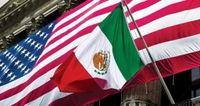Mexican markets suffered on Tuesday, April 2, 2025, after Donald Trump announced that he would impose 'a day of reckoning'. This date is seen as highlighting the extent of economic damage that Trump's policies could cause. A significant portion of the global economy is expected to be impacted by American tariffs imposed on this day. Mexico is expected to suffer the most damage because 80% of its exports go to the United States. Trump had previously imposed 25% American tariffs on Canada and Mexico. Mexico is preparing for the possibility of new tariffs, leading to increased volatility in its markets.
Economic experts believe that the Mexican economy's heavy reliance on exports to the United States puts its social and political stability at risk. Some experts predict that in the worst-case scenario, Trump's tariffs could significantly harm Mexico's economy. While Canada had previously sued the U.S. over trade disputes and imposed retaliatory tariffs, President Claudia Sheinbaum of Mexico has chosen a calmer approach. She has committed to extensive studies reflecting Mexican opinions on the matter and is seen as a model for managing relations with a Trump-led U.S.
Media outlets have praised Sheinbaum for her diplomatic style. The New York Times highlighted her programs, while The Economist lauded her 'diplomatic tact.' However, the situation in Mexico is more complicated than it appears. Louis de la Calle, a trade expert, noted that the Trump administration treats Canada and Mexico differently, which complicates Sheinbaum's strategy.
Critics argue that Sheinbaum is damaging the Mexican economy and future investments by attempting to equalize issues in the country and replacing judges with elected officials. Meanwhile, the domestic economy is already struggling, and she faces pressure to improve relations with the U.S. Experts warn that American tariffs will further weaken Mexico's economy and lead the country down a detrimental path. Sheinbaum finds it challenging to please the American president while also considering rational alternatives.
There is concern regarding how American tariffs will affect the broader Mexican economy. Many experts believe the best hope for Mexico is that the U.S. recognizes the interdependence between their economies. American consumers rely heavily on affordable and reliable Mexican goods, which range from produce to automotive parts and even medical equipment. While Trump might boast of rising incomes in the U.S., the long-term impact of tariffs and trade discord poses risks for American businesses as well.
Given that the U.S. depends significantly on Mexican imports, such a collapse in the Mexican economy could lead to social unrest and increased migration fears. Recent events have added tension to this relationship, especially amid concerns surrounding drug trafficking. The White House recently alleged, 'Mexican drug trafficking organizations have unacceptable ties to the Mexican government.' This claim stirred controversy and raised the stakes for U.S.-Mexico relations.
Joshua Trevino of the America First Policy Institute welcomed this proclamation as a 'groundbreaking declaration' suggesting a new era of confrontation between the two countries. Moreover, discussions have emerged within Republican circles about whether the U.S. should use military force to contend with drug cartels in Mexico, a move that many experts deem ill-advised.
Despite the potential consequences, some influential Mexicans privately suggest that pressure from the Trump administration could compel their government to take stringent actions against drug trafficking, perhaps with U.S. assistance. The alarming discovery of kidnapped recruits held by drug cartels in a 'death camp' highlighted the ongoing brutalities perpetrated by these organizations, with over 100,000 individuals reported missing in Mexico, many of whom are suspected to be victims of drug trafficking.
However, unilateral American military strikes against drug traffickers could place the Mexican government in a precarious situation, even if popular among Trump supporters. Such actions risk dragging the U.S. into an open conflict without addressing the root causes of the drug problem, including arms flow from the U.S. into Mexico and the American demand for illicit drugs.
Trump’s assertions that tariffs are the correct response to drug trafficking, illegal immigration, and trade complicate Mexico's ability to craft a logical response. Therefore, Sheinbaum finds herself in a position where she must appease the American president while hoping that Trump's focus will eventually shift or that his advisers will advocate a more reasonable strategy.
Nevertheless, the imposition of tariffs threatens to erode the most progressive sectors of the Mexican economy and further impoverish the nation. This degradation could yield a resurgence in nationalism and anti-democratic populism, empower organized crime, and drive more Mexicans to seek to cross into the United States.
Given the intertwined destinies of the U.S. and Mexico, the hope lies with the possibility that the U.S. might reconsider its proposed trade wars when faced with the realization of the shared harm a tariff war would inflict. Both nations are interdependent, with American businesses relying on affordable imports from Mexico. If tariffs escalate, Americans could soon feel the impacts of rising inflation, further complicating economic recovery plans that await fruition.
Ultimately, the idea of purposely impoverishing Mexico, one of its largest trading partners, while simultaneously destabilizing it, is misguided for both nations. Yet, there are no guarantees that this scenario can be avoided as both nations grapple with the unfolding repercussions of Trump’s ambitions in a changing global landscape.





